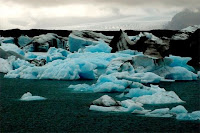Humans are a part of the natural environment. Unfortunately, we have not yet learnt to moderate our activities in such a way as to help the environment. Human activities often lead to degradation of the environment.
Impact of humans include:
- Pollution - land, freshwater creeks and rivers, seas and oceans, and air
- Deforestation and destruction of habitats
- Endangerment and extinction of various plants and animal species.
- Fertile lands being turned to deserts.
- Interfering with the natural cycles of the world
- Overuse of natural resources, resulting in depletion of some of these resources
- Development of extreme weather conditions which is leading to global warming and rising sea levels
- Increased erosion of land as a result of mining or agricultural activities

There have been
some neutral impacts. Native people in many lands have lived in harmony with their
environment for thousands of years and have not harmed nature in anyway
Fortunately, man is learning though a little too late and there are
activities that he is undertaking to conserve whatever is left of the environment. :-
·







